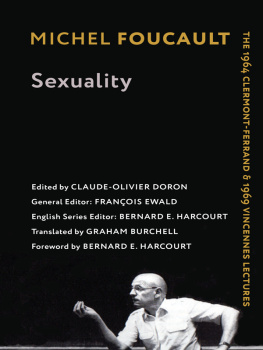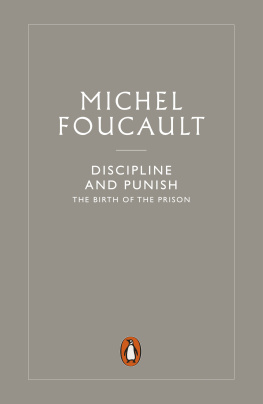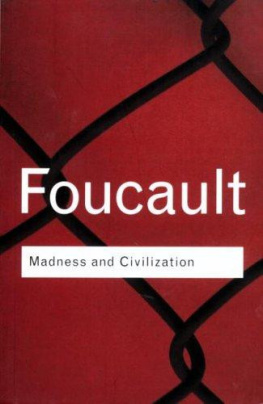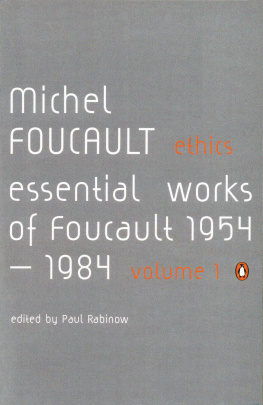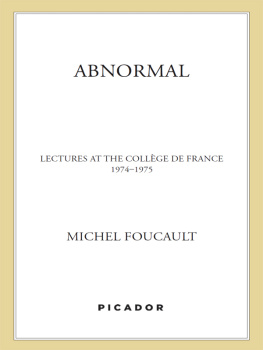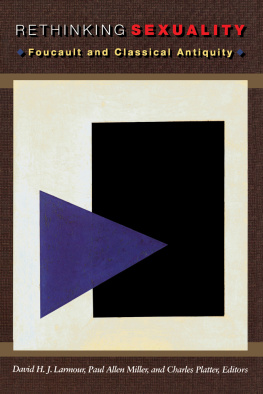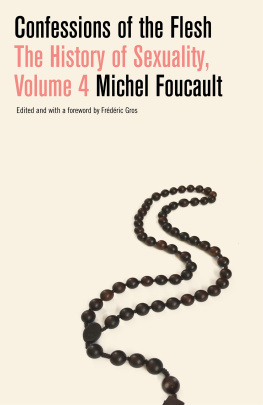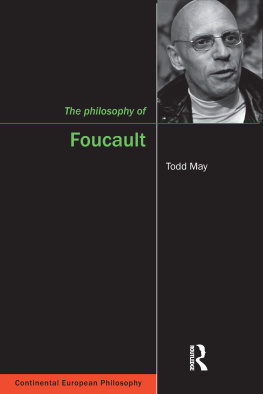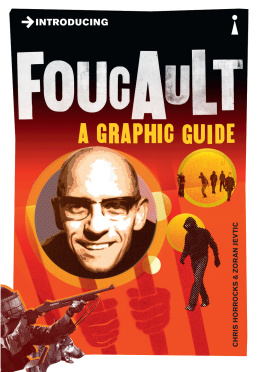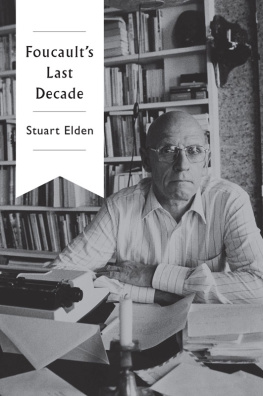Table of Contents
Sexuality
FOUCAULTS EARLY LECTURES AND MANUSCRIPTS
FOUCAULTS EARLY LECTURES AND MANUSCRIPTS
ENGLISH SERIES EDITOR: BERNARD E. HARCOURT
GENERAL EDITOR: FRANOIS EWALD
The philosopher and social critic Michel Foucault began lecturing in the early 1950s on key topics that later gave rise to his major publications, including The Order of Things, Discipline and Punish, and The History of Sexuality. These early lectures and related manuscripts explore central themes ranging from sexuality, existentialism, and phenomenology to anthropology and philosophical discourse, in conversation with key interlocutors including Nietzsche, Husserl, Descartes, and Binswanger. Delivered at universities around the worldfrom Tunis and So Paulo to Montreal, Buffalo, Paris, Lille, and Clermont-Ferrandthese early lectures and manuscripts shed a whole new light on Foucaults lifelong critical project. Collected in this official edition, these works are presented here for the first time in English.
MICHEL FOUCAULT
Sexuality
THE 1964 CLERMONT-FERRAND &
1969 VINCENNES LECTURES
Edited by CLAUDE-OLIVIER DORON
General Editor:
FRANOIS EWALD
English Series Editor:
BERNARD E. HARCOURT
Translated by GRAHAM BURCHELL
Foreword by BERNARD E. HARCOURT
Columbia University Press New York
Columbia University Press
Publishers Since 1893
New York Chichester, West Sussex
cup.columbia.edu
First published in French as
La Sexualit
Cours donn l'universit de Clermont-Ferrand (1964)
suivi de
Le Discours de la sexualit
Cours donn a l'universit de Vincennes (1969)
2018 Seuil/Gallimard
English translation copyright 2021 Columbia University Press
All rights reserved
EISBN 978-0-231-55116-8
Library of Congress Cataloging-in-Publication Data
Names: Foucault, Michel, 1926-1984, author. |
Burchell, Graham, translator.
Title: Sexuality: the 1964 Clermont-Ferrand and 1969
Vincennes lectures /
Michel Foucault; foreword by Bernard E. Harcourt; translated by
Graham Burchell.
Other titles: Sexualit English.
Description: New York City: Columbia University Press, 2021. |
Includes index.
Identifiers: LCCN 2020057788 (print) | LCCN 2020057789 (ebook) |
ISBN 9780231195065 (hardback) | ISBN 9780231195072 (trade
paperback) | ISBN 9780231551168 (ebook)
Subjects: LCSH: SexSocial aspects. | Sex (Psychology) |
Sex customsHistory. | SexPhilosophy.
Classification: LCC HQ12 .F68713 2021 (print) | LCC HQ12
(ebook) | DDC 306.7dc23
LC record available at https://lccn.loc.gov/2020057788
LC ebook record available at https://lccn.loc.gov/2020057789
CUP would be pleased to hear about your reading experience with this e-book at .
Cover design: Chang Jae Lee
CONTENTS
PART I
Sexuality:
Lectures at the University of Clermont-Ferrand (1964)
Lecture 1.
Introduction
Lecture 2.
The Scientific Knowledge of Sexuality
Lecture 3.
Sexual Behavior
Lecture 4.
The Perversions
Lecture 5.
Infantile Sexuality
PART II:
The Discourse of Sexuality: Lectures at the University of Vincennes (1969)
Lecture 1.
The Discourse of Sexuality
Lecture 2.
The Transformations of the Eighteenth Century
Lecture 3.
The Discourse of Sexuality (3)
Lecture 4.
Legal Forms of Marriage Up to the Civil Code
Lecture 5.
Epistemologization of Sexuality
Lecture 6.
The Biology of Sexuality
Lecture 7.
Sexual Utopia
COURSE CONTEXT
by Claude-Olivier Doron
T he practice of philosophy is not linear. It is more of an irruption. And it defies any conventional notion of progress. Although we like to imagine that a philosophical advance represents enduring progress from more rudimentary times, more often it overcomes an obstacle in the moment. It confronts a new problem. It finds a new way out.
Philosophical methods evolve, but that does not mean that earlier approaches are wrong or no longer operative. Nor does it mean that those earlier approaches gave birth to better ones. They addressed a different time. They faced a different conjuncture. They resolved a discrete problem. They served a special purpose. And often, they unveiled one illusion only to expose another.
Indeed, a philosophical praxis from an earlier time may be just as performative today, perhaps even more so. It depends on the situation it confronts. We may need it just as badly, or even more than we did at an earlier time. The exigencies of a new crisis may demand a returnthough even that is never simply a repetition.
To believe otherwise would be to buy into a speculative philosophy of history that has no purchase today. We have long been warned not to believe in origin stories, but instead to see in them a will to know and a will to power.
*
The two sets of lectures on sexuality in this volumethe first from 1964, the second from 1969address two very different political moments, separated by the upheaval of the student revolution of May 1968. Both of those moments, moreover, differ greatly from the political situation in 1976, when Michel Foucault published the first volume of The History of Sexuality, or in 1984, when he published volumes 2 and 3 and made final revisions to volume 4. Those earlier moments differ even more radically from our political times todayeven putting aside the digital revolution that gave birth to our expository society and the myriad ways it intersects with sexual regulation and prohibitions. The term transgenderin its current connotation, using the notion of gender rather than transsexualwould not even have been entirely comprehensible at those earlier times. As Jack Halberstam remarks, only a few decades ago, transsexuals in Europe and the United States did not feel that there was a language to describe who they were or what they needed.
The first set of lecturesFoucaults 1964 lectures on Sexuality delivered at the University of Clermont-Ferrandwere delivered at a time marked by a resurgence of a soft humanism surrounding sexuality following the publication of Simone de Beauvoirs influential book The Second Sex (1949) and the rise of second-wave feminism. This was a humanism that sought to place sexuality within the ethical framework of loving, equal, respectful relations between men and women; but in the process of ethicizing and equalizing heterosexual relations, it further entrenched homosexuality and other perversions into officially diagnosed mental disorders, as in the Diagnostic and Statistical Manual of Mental Disorders, first published in 1952, in which
In the face of this mounting sexual humanism, Foucault turned to the writings of Georges Bataille and, before him, the Marquis de Sade to highlight the experiences of sexuality that were excluded from the dominant ethical conception of sexuality and human nature. Foucault deployed the notions of exclusion, limits, and transgression in 1964 in order to more precisely delineate the character of contemporary Western culture. The spaces of transgression identified precisely the limits of social acceptancewhat could not be allowed to be seen or heard in Western society. Foucault shone a light on perversions precisely to reveal how Western culture idiosyncratically developed its own unique troubled consciousness of sexuality: how it alone had developed a science of sexuality on the basis of those very behaviors; how that science of sexuality had given birth to the social sciences and, at their head, psychoanalysis; how psychoanalysis had begun, thanks to Freud, to reintegrate those perversions into more ordinary conceptions of sexuality; in sum, how Western culture had transformed sexuality into an object of scientific knowledge in order to regulate it. Foucault held a mirror up to contemporary Western society to expose the cunning, hidden devices it used to judge and regulate human behaviorand at what cost.

